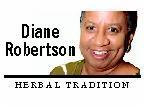
In Revival ceremonies, water is the main element used along with seven or more aromatic herbs and flowers in specific rituals for uplifting and cleansing the mind, body and spirit.
Having a herb bath is an ancient custom in the Caribbean, practised on the plantations from the mistress' boudoir to the lowly zinc-pan concoction placed out in the sun. They were either a ritualistic or healing affair. Today, these baths can be enjoyed in the privacy of one's bathroom or at a spa resort.
Herb baths carry the same effect as aromatic oils, helping to relieve stress, skin afflictions and effect aura cleansing. 'Balming' is usually followed after a ritualistic bath. This is using essential oils to massage or rub the body. The oil is blended in coconut or olive oil or with an aromatic homemade ointment.
Some baths are prepared in a large circular zinc pan filled with water and the required herbs are placed in the hot sun for three hours. The client is placed into the bath and soaked for not more than 10 minutes, and then 'rubbed down'.
Some popular herbs used by our traditional practitioners for influenza and fevers include chopped 2-3 oz. each of lemongrass, eucalyptus and lime leaves. Usually the client is wrapped up after the bath to sweat off the fever. Orange leaves and peel, peppermint leaves and grapefruit leaves are excellent to use for emotional breakdown and mental exhaustion.
Essential oils
Essential oils are derived from plants by the process of distillation. They are also used for candles and incense manufacturing as well as household cleaning agents. It is much easier to use these oils as instructed by an aromatherapist for specific problems or for relaxation. It is best to use between 10-15 drops of an essential oil to a warm hot bath, which is allowed to become tepid before you relax in it.
While relaxing in a herbal bath simply close your eyes to the world, invoke the scents of the bath and scented candles and let go of all the stress and aches. This is an excellent bedtime therapy.
The use of oils is by 'inhalation' which impacts on the emotions and moods and by 'stroking' the physical body known as massage. Most of these oils are good antiseptics and have their own curative effect on parts of the body and its system.
The oil penetrates the skin through the extracellular liquids and reaches into the blood and lymph, which in turn is carried into the circulatory system. This process duration varies in individuals, taking from 30 minutes to 12 hours for actual skin penetration. It is important not to bathe until six to 12 hours after an aromatic massage.
There are many ways to experience the benefits of essential oils, which involves 'inhalation' for alertness, sinus conditions and colds.
Warning
It is advisable not to apply essential oils to the skin. They must be combined with carrier oils. Aromatherapy is an art and must be practised by one with knowledge and experience.
Dr. Diane Robertson is a pharmacist and recipient of an honorary doctorate in complementary medicine for her work in herbs; email: yourhealth@gleanerjm.com. 
